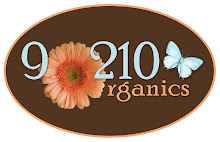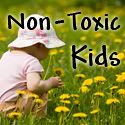This article was written by Sarah Outlaw, Co-Owner of 90210 Organics for Natural Life 101.com. We thought that it would be of interest to our natural mommy readers!
Obesity has become an epidemic in our country. What is even more alarming is that it is our children that have made this statistic the way that it is. A recent study has shown that health complications from being overweight from childhood on may lead to this generation of children dying before their parents. Parents need a wake-up call as to what is happening all around them. Major food companies must be held accountable for the blatant propaganda that they target at our children to sell their horrible junk food. All health conscious individuals must act now to make others aware of the facts surrounding food and children so that this sad prediction never becomes a reality.
What can you do as a parent now while your children are young to prevent them from becoming obese? Learning how to feed them properly is the number one way for them to stay healthy and at an ideal weight. It does take extra effort to prepare healthy, nourishing meals but our children are more than worth it. This week begins a two part series on the proper feeding of babies and children. There is so much information that just is not true out there. If we are going to feed our children in such a way that they will not end up a statistic, then we must be armed with the truth and know exactly how and what to feed them.
Feeding children properly begins in the womb. A pregnant mother’s diet should consist of plenty of fresh fruits and vegetables, sprouted whole grains, organic (preferably raw) dairy, grass-fed and free-range meats, plenty of pure water, and fresh juice. Pregnancy only lasts for 40 weeks but if you are fortunate to plan ahead for pregnancy, you can change your diet in advance. It may seem a little extreme, but cut out coffee and soda completely. Caffeine is not good for a woman trying to conceive and it is not good for a growing baby. Cut out all artificial sweeteners completely. There is no place for them in your life. Think fresh, organic and local when choosing produce and preparing meals.
When your baby is born, the absolute best food for her is breast milk. There is nothing on this planet that can come close to the perfect food that breast milk is. It does not matter what the formula companies tell you, their manufactured, highly processed products do not even come close. Breast milk even acts as a medicine for your baby. It contains antibodies and builds the immune system. It is a fact that breastfed babies have fewer respiratory illnesses, fewer ear infection, fewer intestinal problems, and urinary tract infections. There are substances in breast milk that enhance the parts of the brain that dictate intelligence and also aid brain development. Breast milk also protects against cancers, leukemia and yes, even obesity. Because pesticides can pass through breast milk, it is very important that a mother eat organically while breastfeeding.
Most pediatricians worth their salt will tell you to breastfeed for at least one year. The American Academy of Pediatrics recently changed that recommendation one year and beyond, or “as long as is mutually beneficial”. They also state that the longer a child is breastfed, the less likely he is to become overweight. This is a fact that we breastfeeding moms have know for awhile, but it usually takes the mainstream media a lot longer to catch on. Many mothers have decided that extended breastfeeding past two years is even more beneficial to their children. Society tends to look down on mothers who breastfeed for more than two or three years, but there are more and more people that are praising the benefits and silencing the objectors.
When a baby is ready, and only the baby knows when the time is right, introducing solids can be a great adventure. In natural mothering circles, we believe that starting a baby on cereal is not the best way to introduce solids. It just does not make sense to go from breast milk, the perfect food to processed cereal. Starting babies on cereal too early can lead to gastrointestinal problems, allergies, asthma, eczema and other common ailments. Some babies are ready for solids at six months; some may not be ready until ten months to one year old. Making your own baby food out of fresh, organic and local fruits and vegetables is always the best way to go. Jarred baby food is not fresh and really not adequate for regular feeding.
The best foods to start baby on are avocado, banana, sweet potato, and egg yolk. Do not give egg whites to start with because many babies will have an allergic reaction. The yolks are fine and contain many nutrients essential for growth and development. Choose organic, pastured, free-range eggs whenever possible for optimal nutritional value. After those foods have been introduced and a few months have gone by, introduce squashes, peas, vegetable soups, peaches and nectarines (organic of course). Giving carrots to infants younger than six months can actually be dangerous because of the high levels of nitrates present. Babies have less stomach acid than adults and when nitrates enter the stomach, they turn toxic. These toxic nitrates convert hemoglobin that is in red blood cells to methemoglobin. Methemoglobin cannot carry oxygen and a baby can become asphyxiated. If you have ever heard of Blue Baby Syndrome, nitrates are what cause it.
When a baby gets to be about one year of age and seems ready, introduce other fresh foods and even raw milk and kefir at this time. Most babies will not want it and if you are breastfeeding, there is really no need to supplement with other milk until later. Many babies will not want to eat meat until after a year. If you introduce a food that your baby does not like or has an allergic reaction to, wait awhile and reintroduce that same food. Sometimes, she just was not ready. As a side note, do not be afraid of butter. Putting organic butter on cooked sweet potatoes for example helps unlock all of the carotenes and vital nutrients. Butter is also a wonderful source of medium chain fatty acids which help in brain development. Also after a year old, a baby is now finally ready to handle grains. Sprouted whole grains are the best because they are more easily digested by the body. Grains in themselves are a leading contributor to obesity because the carbohydrates turn into sugar and ferment in the gut. Whole grains are better, but again sprouted grains are the number one choice.
Feeding your growing baby should be a positive experience, an adventure even. By planning ahead and making up your mind to breastfeed, make your own baby food, and choose only organic, fresh and local ingredients whenever possible, your baby will receive the best start in life that you can possibly give. You will have set him on a path to good health and have introduced him to a wide variety of good foods that will not only nourish his body but will also make him a better eater as an adult. He will be less picky and more likely to make wise food choices.
Stayed tuned as next week we discuss the proper feeding of children, toddlers to teens.
For more information on healthy children, please consider the following resources:
The Complete Organic Pregnancy by Deirdra Dolan and Alexandra Zissu
Child Health Guide by Dr. Randall Neustaedter
Generation XL by Dr. Joseph Mercola and Dr. Ben Lerner
http://www.mercola.com/http://www.westonaprice.org/Get Healthy, We'll Show You How™





















 SustainabiliTee Golden Eagle Fresh Print Tee
SustainabiliTee Golden Eagle Fresh Print Tee 




 Linscope Green Fiber Optic Cat's Eye
Linscope Green Fiber Optic Cat's Eye

 Linscope Wood Agate Round Stone
Linscope Wood Agate Round Stone








 So, if you are like us and just have to buy these
So, if you are like us and just have to buy these 
























